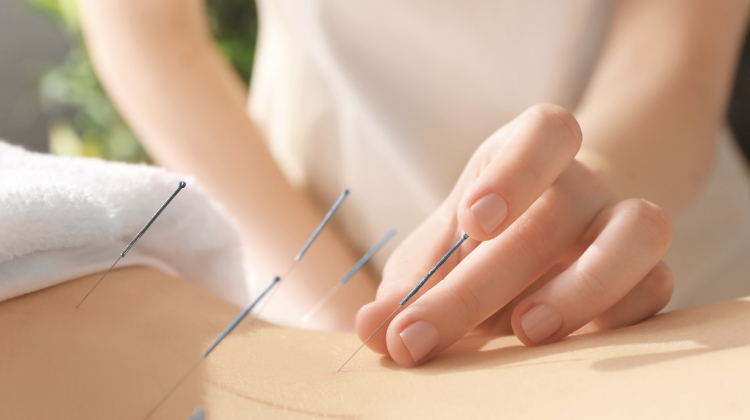 Expert's opinion
Expert's opinion
Expert's opinion
The article is a subjective view on this topic written by writers specializing in medical writing.
It may reflect on a personal journey surrounding struggles with an illness or medical condition, involve product comparisons, diet considerations, or other health-related opinions.
Although the view is entirely that of the writer, it is based on academic experiences and scientific research they have conducted; it is fact-checked by a team of degreed medical experts, and validated by sources attached to the article.
The numbers in parenthesis (1,2,3) will take you to clickable links to related scientific papers.
7 Complementary & Alternative Therapies for Mental Health 2024

If you have mental health problems, it may benefit you to look into complementary and alternative mental health therapies.
People reach for alternative medicine when they have tried mainstream health care and experienced side effects or didn’t feel relief from symptoms.
Sometimes, traditional medicine isn’t enough to meet an individual’s needs. To feel better mentally you may need complementary therapy to add to the treatment you’re already receiving.
If you, or someone you love and care for, are struggling with mental illness, it is worth looking into what types of complementary and alternative mental health treatments are available.
7 Complementary & Alternative Treatments for Mental Health
There are many complementary and alternative medicine (CAM) therapies that promote healthy living and good mental health. Here are a few:
- Animal-assisted therapy
- Acupuncture
- Music and art therapy
- Nutraceuticals
- Deep breathing techniques, meditation, and mindfulness
- Emotional freedom technique
- Exercise
7 Complementary & Alternative Treatments for Mental Health
Conventional therapy tends to treat symptoms but can fail at getting to the root source of the problem. People are not one-size-fits-all, and what works for you may not work for someone else. Also, people change, and what worked for you before may not work for you now.
The mental health professionals using alternative therapies look at a person’s mental health issues holistically. They know that what is affecting them mentally and emotionally is connected to their physical and spiritual health as well.
Complementary health approaches often combine psychotherapy and/or medication with alternative mental health therapy to meet their goals.
There are many complementary and alternative medicine (CAM) therapies that promote healthy living and good mental health. Here are a few.
Animal-Assisted Therapy

Animal therapy connects patients to different types of animals to help a person grow cognitively, emotionally, and socially. This activity lowers stress levels by engaging with furry creatures.
There are domesticated and non-domesticated animals used for therapy, like eagles, owls, chickens, sheep, goats, and dogs.
Equine therapy is a popular type of animal therapy[1] that involves horses. These animals are very in tune with the emotions that humans around them are experiencing.
Equine-assisted psychotherapy helps you form a connection with a horse to build self-awareness and self-esteem. It helps guide people to monitor their impulses, emotions, and behaviors. Interacting with such a powerful animal peacefully helps teach you how to deal with problems you feel are bigger than you.
There are ranches and farms dedicated to teaching people how to groom and ride horses. You’ll learn how to communicate with the horse and be a caregiver to this intuitive animal.
It’s also available to those with mental illnesses, young adults with special needs, the homeless, and trauma victims.
You can choose a day program or a residential program where you can focus on rehabilitation and even live with the animal.
The reflection on relationships and a sense of accomplishment received from therapeutic sessions can aid in the healing process for trauma or traumatic childhood, as well as treat depression and anxiety.
Acupuncture

Acupuncture is a Chinese medicine treatment that balances your body’s flow of life and energy by stimulating your meridians or pathways, interconnections within your body accessible via your skin.
It treats symptoms of mental health disorders like depression, stress, and anxiety. It’s also used for
- Head injuries
- Nausea and vomiting from chemo or surgery
- Pain, including headaches, joint pain, dental pain
- Menstrual cramps
- Ear infections
- Gallbladder problems
Your therapy sessions are usually in a quiet and relaxing room. The health professional will insert tiny, single-use needles into specific areas of your body to help re-balance your flow. Most people feel no pain as the needles are placed. Sessions can be from 10 minutes to an hour, depending on the condition.
This treatment can be very relaxing or energizing, depending on if the energy flow was directed upward or downward. Some ailments take one time to treat, while others may need several sessions to heal.
Music and Art Therapy

These two therapies are used by many in combination with talk therapy to get the full benefit. They can increase feelings of self-worth and help you process big emotions you typically might not let surface.
These help people work on their physical and mental health issues. They provide a safe way to relieve stress and anxiety.
Music therapy is used by many to treat depression. Whether you’re playing it, composing it, or listening to it, the power of music is unlike other treatments.
Listening to the complexities of music will send it to all parts of the brain, not just the part for hearing.
Art therapy promotes healing through creative expression. Art includes but is not limited to
- Painting
- Drawing
- Coloring
- Photography
- Storytelling
- Crafting, like knitting, making jewelry, or origami
- Woodworking
This study[2] on mental health, music, and immunity and this study[3] about art’s healing power show both music and art to be effective physical and psychological therapies.
Trying music or art therapy can be done at your home if you haven’t found your way into a program just yet. Utilizing YouTube or mobile apps can help guide you and aid relaxation as you try different techniques.
Nutraceuticals

Many patients have side effects from the medications prescribed by their healthcare providers. Then they may be prescribed another medication to help with the side effect of the first medication. This can continue in a vicious cycle creating chaos in the patient’s body.
Some medications[4] that treat mental health problems have been shown in medical trials to have side effects like liver toxicity, fatigue, headaches, and dizziness that a person might want to avoid if they can. Also, for those with liver or kidney problems, doses may not be adjusted correctly and lead to toxicity.
Nutraceuticals are foods that have medicinal benefits and may come in a powder, pill, or liquid form. They are used to treat mental health conditions and can be used to complement or as an alternative to pharmaceuticals.
These are known for their positive effects[5] on immune systems, obesity, diabetes, Alzheimer’s disease, inflammation, and eye disorders.
Nutraceuticals use anti-oxidation properties to help prevent cancer and coronary artery disease. They have beneficial effects[6] on mental illnesses like major depression, bipolar disorder, ADHD, and schizophrenia. These can also treat anxiety and stress disorders.
If you are taking any pharmaceuticals, there can be drug interactions with herbal medicine. Make sure to check for any reported interactions before starting something new.
Studies[7] strongly suggest that omega-3 has significant beneficial effects for those fighting depressive disorders.
Some other treatments in the nutraceutical family used for mental health include:
- Alpha-lactalbumin
- Calcium
- Folate
- Ginkgo
- Inositol
- Kava
- Magnesium
- Passionflower
- S-Adenosylmethionine
- St. John’s Wort
- Vitamin B-12
- Zinc
Deep Breathing Techniques, Meditation, and Mindfulness

Connecting the flow of your breathing and the state of your mind helps to balance your whole self, especially in stressful situations. Those with mental health disorders can learn and benefit from these techniques.
Deep breathing exercises can reduce anxiety and boost oxygen to your brain so you can think more clearly. Studies show[8] possible benefits, e.g., deep breathing can lower stress response and improve cognitive function.
One of the most popular breathing exercises that can de-stress and help a person fall asleep is called 4-7-8.
It works by deeply exhaling all of your breath. Then you inhale deeply through your nose while you count to 4. You hold your breath while you count to 7. Then count to 8 while you exhale your breath out of your mouth.
Many use deep breathing as part of their spiritual practice during meditation and mindfulness[9] exercises which can help manage depression, pain, anxiety, and substance withdrawals.
You can find this therapy available in-person or virtually through mobile apps, podcasts, books, and YouTube videos. Once you get the hang of deep breathing, you’ll find yourself using this therapy throughout your day.
Emotional Freedom Technique

This type of alternative therapy helps create balance by tapping your body in specific areas. It helps people cope by reducing the intensity of negative feelings that can be caused by stress, anxiety[10], and other mental disorders.
It’s based on tapping the meridian points that Chinese medicine uses, like acupuncture, to use your energy to stimulate your brain and body to heal. Instead of using needles, the emotional freedom technique (EFT) uses fingertips for acupressure.
There are therapists to guide you. Once you learn it you can practice it on your own. Here is a summary of the EFT process.
- Identify what the negative feeling is. It could be fear, sadness, or stress-related emotion.
- Score how intense the feeling is on a scale of 1-10.
- Speak positive affirmations involving the feeling and self-acceptance regardless of the problem you’re facing.
- Then the tapping phase takes place, and more positive affirmations are spoken several times.
- After you’re done, you’ll again rate the feeling on a scale of 1-10. Most repeat the process until the score is 0.
Exercise

Studies show[11] that exercise can prevent and decrease the risk of cardiovascular disease, weight gain, arthritis, and sleep disorders. Did you know that exercise can also help with mental health problems like stress, anxiety, depression, and bad moods?
When you exercise, your body can give your brain energy. This releases feel-good chemicals like endorphins and can make you feel better. Endorphins, in turn, help release other feel-good neurotransmitters[12], like dopamine and serotonin. Exercise also boosts your self-esteem and feelings of accomplishment.
It doesn’t have to be an excruciating sweat-slinging exercise to fuel your brain. 30-minutes a day, 3 to 5 times each week, can help reduce negative emotions. Find a physical activity you can enjoy so you can commit to it.
Here are a few types of exercises to boost your brain health
- Swimming
- Brisk walking
- Tai Chi
- Strength training
- Dance
- Jump roping
You can walk at the park (double points for nature therapy) or join a gym with group exercises and all the equipment you could want.
The Bottom Line: Does It Really Work?
There is limited research on complementary and alternative therapies, but more research is accumulating all the time. There are many testimonials of people who had success with these. Finding what works for you is what counts!
Research[13] the type of CAM treatments, compare treatment costs with different companies and read reviews of the person leading the therapy. Check their credibility and determine if you can see yourself in their program. Many provide free consultations. You should always check with your health provider before beginning treatment.
+ 13 sources
Health Canal avoids using tertiary references. We have strict sourcing guidelines and rely on peer-reviewed studies, academic researches from medical associations and institutions. To ensure the accuracy of articles in Health Canal, you can read more about the editorial process here
- Bert, F., Gualano, M.R., Camussi, E., Pieve, G., Voglino, G. and Siliquini, R. (2016). Animal assisted intervention: A systematic review of benefits and risks. European Journal of Integrative Medicine, [online] 8(5), pp.695–706. doi:10.1016/j.eujim.2016.05.005.
- Rebecchini, L. (2021). Music, mental health, and immunity. Brain, Behavior, & Immunity – Health, [online] 18, p.100374. doi:10.1016/j.bbih.2021.100374.
- Stuckey, H.L. and Nobel, J. (2010). The Connection Between Art, Healing, and Public Health: A Review of Current Literature. American Journal of Public Health, [online] 100(2), pp.254–263. doi:10.2105/ajph.2008.156497.
- Carrier, P., Debette-Gratien, M., Girard, M., Jacques, J., Nubukpo, P. and Loustaud-Ratti, V. (2016). Liver Illness and Psychiatric Patients. Hepatitis Monthly, [online] 16(12). doi:10.5812/hepatmon.41564.
- Nasri, H., Baradaran, A., Shirzad, H. and Rafieian-Kopaei, M. (2014). New concepts in nutraceuticals as alternative for pharmaceuticals. International journal of preventive medicine, [online] 5(12), pp.1487–99. Available at: https://www.ncbi.nlm.nih.gov/pmc/articles/PMC4336979/
- Firth, J., Teasdale, S.B., Allott, K., Siskind, D., Marx, W., Cotter, J., Veronese, N., Schuch, F., Smith, L., Solmi, M., Carvalho, A.F., Vancampfort, D., Berk, M., Stubbs, B. and Sarris, J. (2019). The efficacy and safety of nutrient supplements in the treatment of mental disorders: a meta‐review of meta‐analyses of randomized controlled trials. World Psychiatry, [online] 18(3), pp.308–324. doi:10.1002/wps.20672.
- Wani, A.L., Bhat, S.A. and Ara, A. (2015). Omega-3 fatty acids and the treatment of depression: a review of scientific evidence. Integrative Medicine Research, [online] 4(3), pp.132–141. doi:10.1016/j.imr.2015.07.003.
- Ma, X., Yue, Z.-Q., Gong, Z.-Q., Zhang, H., Duan, N.-Y., Shi, Y.-T., Wei, G.-X. and Li, Y.-F. (2017). The Effect of Diaphragmatic Breathing on Attention, Negative Affect and Stress in Healthy Adults. Frontiers in Psychology, [online] 8. doi:10.3389/fpsyg.2017.00874.
- NCCIH. (2020). Meditation and Mindfulness: What You Need To Know. [online] Available at: https://www.nccih.nih.gov/health/meditation-and-mindfulness-what-you-need-to-know
- Clond, M. (2016). Emotional Freedom Techniques for Anxiety. Journal of Nervous & Mental Disease, [online] 204(5), pp.388–395. doi:10.1097/nmd.0000000000000483.
- Sharma, A., Madaan, V. and Petty, F.D. (2006). Exercise for Mental Health. The Primary Care Companion to The Journal of Clinical Psychiatry, [online] 08(02), p.106. doi:10.4088/pcc.v08n0208a.
- Ali, A.H., Ahmed, H.S., Jawad, A.S. and Mustafa, M.A. (2021). Endorphin: function and mechanism of action. Science Archives, [online] 02(01), pp.09-13. doi:10.47587/sa.2021.2102.
- National Cancer Institute. (2022). Complementary and Alternative Medicine (CAM). [online] Available at: https://www.cancer.gov/about-cancer/treatment/cam.



